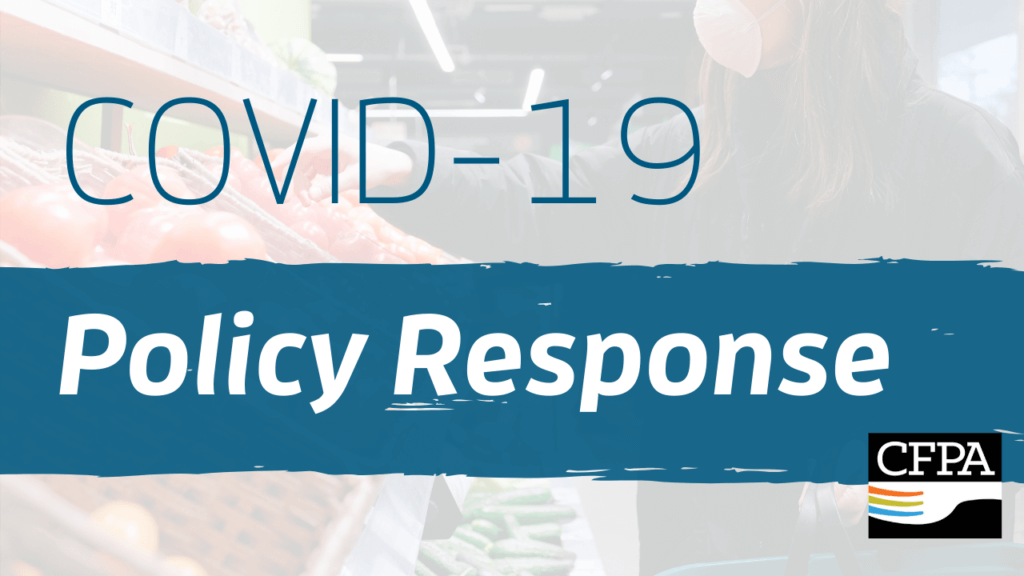The COVID-19 emergency is rapidly evolving. Related state and federal policy changes are mirroring that pace of change. Please keep the timestamp in mind when considering the content below.
What We’re Doing
The team at California Food Policy Advocates is grateful to be working with national, state, and local partners to advance timely, effective policies that support the health and well being of Californians struggling to meet their basic needs. During the immediate COVID-19 crisis and in its aftermath, we will
- Raise priorities with the CA Department of Education, the Department of Social Services, the Department of Public Health – WIC, the Department of Aging, and other state agencies;
- Communicate with state legislators about California solutions to hunger, poverty, and food insecurity;
- Proactively engage California’s congressional delegation about much-needed federal policy change;
- Reach out to communities to better understand existing challenges and desired solutions; and
- Widely share information & opportunities to take action.
To learn more about our overarching efforts, please see our federal, state legislative, state administrative, and policy research agendas.
To access all of our COVID-19 updates and materials, visit:
What We’re Hearing
The COVID-19 pandemic is making it even more difficult for many Californians to safely access the food they need to live healthy lives. We are hearing about hardships across the state, such as
- An urgent need for economic relief, including through Pandemic-EBT (P-EBT), more CalFresh benefits, and direct payments for households with low income;
- Limited operating hours and pending closures of meal distribution sites, including school-based sites, as well as limited availability of meals at some sites;
- The exclusion of many immigrant Californians from existing, newly created, and recently expanded sources of support.
We appreciate all who have reached out to share the challenges you’re facing and the changes that would better support your communities as California grapples with COVID-19. Please continue to share this critical information with us.
We are with you to amplify important issues and advocate together. You can reach our team by contacting tia@cfpa.net.

We recognize that COVID-19 requires a comprehensive, short- and long-term response. The policy priorities below reflect pressing issues but are not meant to represent the totality of such a response.
Equitable & Inclusive Solutions
COVID-19 affects us all. Policy responses to this crisis should be equitable and inclusive.
What do we mean by equitable?
- Provide the most support to Californians experiencing the greatest need, including individuals living in chronically under-resourced communities harmed by systemic racism.
What do we mean by inclusive?
- Don’t leave anyone behind, including our immigrant friends, families, colleagues, and neighbors.
- Reject xenophobia and discrimination: fight COVID-19 with facts and protect our Asian communities.
What types of solutions are needed?
- Enact COVID-19 relief policies, such as direct payments and health care for individuals and families, that are inclusive of immigrant households.
- Extend Pandemic EBT to include young children and older adults who are eligible for meals under the Child and Adult Care Food Program and have been negatively impacted by site closures.
- Ensure that newly issued forms of support can reach all Californians experiencing need, including those experiencing homelessness and living without consistent access to a mailing address.
Maximize Access to Food
From school closures to layoffs, COVID-19 is driving changes that dramatically decrease the resources Californians have available for food. New policies should mitigate the scope and scale of harm by creating new food resources, increasing existing sources, and minimizing barriers to both.
What types of solutions are needed?
- Expand financial relief for low- and moderate-income households.
- Increase the minimum and maximum amount of CalFresh/SNAP benefits available to all participating households.
- Suspend all federal rulemaking, including changes to CalFresh eligibility and benefit calculations, that would decrease access to nutrition resources or diminish benefit levels for low-income Californians.
- Temporarily increase the cash value benefit to provide additional temporary relief to WIC families.
- Quickly implement Pandemic EBT without requiring eligible families to proactively apply and by using a phased-in approach that allows benefits to reach children in the shortest amount of time.
- Sustain non-congregate meal sites and Pandemic EBT through the crisis and into the summer and implement flexibilities that give ready access to all children and adults impacted by the closures of schools, child care, or adult care.
- Align food access with public health orders and protect the safety of program participants by allowing and expanding online and curbside food purchases through WIC, as is now being planned for CalFresh.
- Proactively communicate with individuals and families about available resources, including targeted, cross-program outreach to those who are newly eligible for WIC, SNAP/CalFresh, Pandemic-EBT, and non-congregate meals.
Prepare for Long-Term Effects
Californians will feel the effects of the COVID-19 crisis long after the immediate emergency has passed. And this crisis highlights the long-standing need to fight hunger and poverty across our state. Protecting the health and wellbeing of Californians in the wake of COVID-19 must be a priority.
What types of solutions are needed?
- Target State investments to give more students access to universally free breakfast and lunch.
- Establish options to give our youngest children access to universally free meals in preschools and child care settings.
- Provide nutrition assistance to all immigrant Californians who are struggling to make ends meet.
- Build on what works: effective solutions harnessed during the COVID-19 crisis should continue as long-term efforts to mitigate hunger and poverty across California. For instance, permanently remove unnecessary CalFresh reporting requirements and streamline the application process to be fully completed online or over the phone.
In solidarity, we hope you are safe and well during these turbulent times.
Questions? Contact: Tia Shimada at 510.433.1122 or visit www.cfpa.net/covid19




